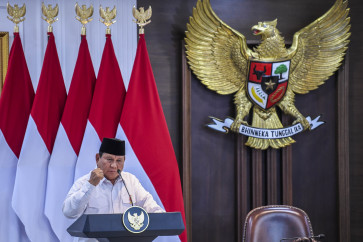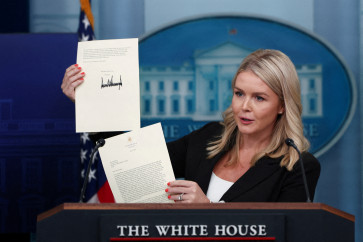Popular Reads
Top Results
Can't find what you're looking for?
View all search resultsPopular Reads
Top Results
Can't find what you're looking for?
View all search resultsFinancial disintegration as nemesis after hubris
In the past, history has concerned itself with the military exploits of distinguished brigands
Change text size
Gift Premium Articles
to Anyone
In the past, history has concerned itself with the military exploits of distinguished brigands. Today, history concerns itself with the pathological exploits of psychopathic and myopically self-assured financiers and it is their recklessness that has brought us into the present blind alley.
Of course, even while causing havoc in our lives, both the financiers and we ordinary people with our meager bank deposits are still expecting happy endings. But none of them is in the making. Precisely because we won't get one, we tend to become introspective, seeking solace in musing or soul-searching. Some have even called in psychics, while others are conducting seances.
The masters of the media are kept busy responding to desperate phone calls from readers with high stakes in these jittery times. In turn the media keeps pounding on the doors of the pundits in its search for some soothing words with any sounds of hope, no matter how fragile or even how bogus the hope is. In these shaky times, there is then no distinction between economic science and tarot readings.
And, indeed, for some time I have been having serious doubts about the real differences between technical economics and feel-good counseling. The former's principal aim is increasingly little more than suggesting a finessed nostrum in order to prevent financial despondency from spreading, no matter how incongruous it is with the hard facts jealously defended by so-called scientific rigor. That's why technical economics gradually inclines toward missing out what is staring us in the face.
However, any nostrum is likely to remain troubling, for the reality of the present predicament turns out to be too large for pundits, or perhaps the pundits are too small for the predicament. Indeed, the financial crisis is here to stay for some time, and no amount of instant fixing is likely to drive it away.
But why should these words of solace or pedantic technicalities in haut monde finance remain pale? It is because all this is like asking an eye to make a visual inspection of itself. In such an act, no one is of course aware of his/her own economic myth, anymore than that person can smell his/her own breath.
To paraphrase a memo from Hegel, that venerable German philosopher, any analysis or musing at this very moment "in any case always comes on the scene too late", for an "actuality is already there cut and dried after its process of formation has been completed". In his other famous words, "the owl of Minerva spreads its wings only with the falling of the dusk". Indeed, wisdom ceases to be an aspiration of the finest and now has simply become the hazardous venture of pragmatism.
But, if soul-searching is to be of some momentary use to our distraught condition, it warrants us to be painfully independent from the stampede. And here is something else that may be unpalatable. As being in exile helps one to understand one's home, so it has taken financial detritus to understand what a healthy economy ought to be.
First, in an oft-repeated notion of ancient origins, the term of course coming from a Greek word -- oikonomia or management of the household. What the term meant was well rehearsed by at least two ancient thinkers, Xenophon and Aristotle. However, it was Aristotle who in haste sharply differentiated it from what he called chrematistike. In his celebrated Politics, he distinguished oikonomike as the art of good household management and chrematistike as a ploy of unnatural quest for money for its own sake.
Of course, etymological origin is one thing, modern doctrine is another. The distinction is reviewed here not to sanction a return to the lost semantic past. Rather, out of this distinction there is one precious lesson before which we stand not only aghast but uncomprehending. It is a compelling truth that what we and most pundits have been thinking and calling today is too remote from what is intended to be. Instead, what is meant in today's parlance is in fact chrematistike. No wonder, rather than being beneficial, it has brought havoc to individual and national households.
But, how has this gross deception been kept intact and uncorrected? For fear of going too far afield, suffice it to say that this misconception has developed very rapidly from the mid-nineteenth century and eventually makes up what we call today mainstream economics with which the present profit-amassing economic system is ardently justified. And this brings us to the second point.
Secondly, at the heart of this oikonomia-turn-chrematistike is an idea reminiscent of Newtonian physics, in that profit-amassing activities are seen as a mechanism, an interplay of variables. It is a mechanism whose workings depend not so much on human actions than on the gravitational movements of all elements taken as an aggregate.
These elements range from interest rates to corporate options, from asset prices to toxic debts. What is important here is not "who" does these profit-amassing activities, but "what" causes them. By the same token, the success and failure of this economic system is then being emptied of human causalities. It is through this bizarre ploy that mainstream economics is invested with an aura of rational science. This of course is a mirage, for a human science emptied of human deeds cannot but lose its raison d'etre.
With the blotting out of questions, the most devastating consequence is perhaps the erasure of human responsibility from the equation. Armed with the arsenal of irresponsibility, the orgy of financial recklessness is dragging us into the present predicament. The Greeks would have called it nemesis after hubris. And now we are left to pick up the pieces.
The point of all these national bailouts, from the U.S. to Europe and perhaps Asia, is to socialize private losses that are not of ordinary people's making. Isn't this the purpose of the concept "externality" so celebrated by corporate managers? The meaning is plain: Profit is mine, the cost someone else's problem.
Of course, the caveat for all this soul-searching is that whatever we think now may soon prove wrong, if only because history is full of surprises. In the meantime, however, it is apt to heed another warning from an ancient mandarin, Plato, in his famous Republic: "If the just man is an expert in guarding money, he is an expert in stealing it".
The writer, a lecturer in the Postgraduate Program at The Driyarkara School of Philosophy, Jakarta, holds a PhD from The London School of Economics.










